French actor and singer Armand Mestral (1917-2000) started his film career after the Second World War. At first, he often played bad guys, and later he played character roles both in the cinema and on television.
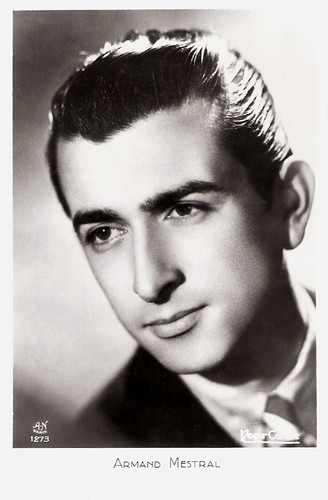
French postcard by A.N., Paris, no. 1273. Photo: Roger Carlet.
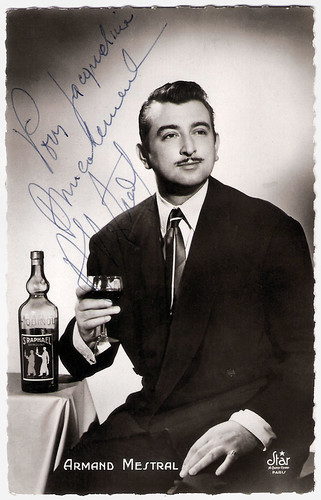
French postcard by Studio Star, Paris. Photo: Star, Paris.
Armand Mestral was born in 1917 in Paris, France, as Armand Serge Zelikson. His father was the Russian sculptor Chlioma Zelikson, and his mother was the designing artist Alice Eugénie Mestrallet.
Armand began his career as a lyrical singer with a beautiful bass voice at the Saint-Roch church in Paris. He was engaged in the Gaîté-Lyrique theatre and appeared in operettas such as 'Le Pays du sourire' (The Land of Smiles) by Franz Lehár, 'Colorado' and 'Gypsy Song' by Maurice Yvain. He recorded several chansons and his French versions of 'Jézabel' (Jezebel) and 'Mississippi' (Ol' 'Man River) were among his greatest hits, which also included 'Chant des partisans' and 'L'Internationale'.
During the Second World War, he participated in the Resistance by sending messages through the collaborationist journal 'La France socialiste'. After the war, he started to play in films, first often as a bad guy. His film debut was L'extravagante mission / The Queer Assignment (Henri Calef, 1945). Till 1992, he appeared as an actor and a singer in more than seventy French films from 1945 to 1992.
In 1953, he sang the French song 'Le Beau Pedro' in the comedy Soyez les bienvenus / Welcome (Pierre Louis, 1953). The song, which was written by Henri Betti (music) and Jean Nohain (lyrics), was also used that year in the hit film Le Portrait de son père / His Father's Portrait (André Berthomieu, 1953) with Jean Richard and Brigitte Bardot.
A well-known film with Mestral was Gervaise (René Clément, 1956) starring Maria Schell and based on the novel 'L'Assommoir' by Émile Zola. Schell plays a working-class woman in the mid-nineteenth century, trying to cope with the descent of her husband (François Périer) into alcoholism. Mestral played Lantier, Gervaise's former lover. The film was nominated for the Best Foreign Language Film at the 29th Academy Awards. Schell won the Volpi Cup for Best Actress at the 1956 Venice Film Festival.
He played a chauffeur in the crime film Enigme aux Folies-Bergère / The Enigma of the Folies-Bergere (Jean Mitry, 1959) about a series of murders at the Folies-Bergère. Mestral co-starred with Bella Darvi, Frank Villard and Dora Doll.

French postcard by Editions P.I., Paris, offered by Les Carbones Korès, no. 27 E / 458. Photo: Ch. Vandamme.

French postcard by Editions P.I., Paris, offered by Les Carbones "Arrow" "Carbofrance", no. 160. Photo: Ch. Vandamme, Paris.
During the 1960s, Armand Mestral appeared in several international co-productions, like the Peplum Morgan il pirata / Morgan, the Pirate (André de Toth, Primo Zeglio, 1960). Steve Reeves starred as Sir Henry Morgan, the 17th-century pirate who became the self-proclaimed governor of Jamaica. In Italy, he also appeared in the French-Italian coproduction L'ammutinamento / White Slave Ship (Silvio Amadio, 1961), starring Pier Angeli and Edmund Purdom, and in the adventure film Duello nella Sila / Duel of Fire (Umberto Lenzi, 1962), starring Fernando Lamas and Liana Orfei.
Back in France, he played a supporting part in the crime film Chair de poule / Goosebumps (Julien Duvivier, 1963) starring Robert Hossein, Catherine Rouvel and Jean Sorel. The screenplay was based on the novel 'Come Easy, Go Easy' by James Hadley Chase, which took several plot elements from 'The Postman Always Rings Twice' by James M. Cain.
In Germany, he appeared in the French-West German drama Begegnung in Salzburg / Encounter in Salzburg (Max Friedmann, 1964) starring Curd Jürgens, Nadia Gray and Viktor de Kowa. He also played i the French-Italian-Spanish adventure film Surcouf, le tigre des sept mers / The Sea Pirate (Sergio Bergonzelli, Roy Rowland, 1966), featuring Gérard Barray. He also had a small role in the American war film Lost Command (Mark Robson, 1966) starring Anthony Quinn, Alain Delon, George Segal, Michèle Morgan, Maurice Ronet and Claudia Cardinale. The film, based on the best-selling 1960 novel 'The Centurions' by Jean Lartéguy, focuses on the story of French paratroopers battling in French Indochina and French Algeria.
On television, he frequently participates in such popular series as Les Cinq Dernières Minutes / The Last Five Minutes (1958-1960), Les Brigades du Tigre / The Tiger Brigades (1976) with Jean-Claude Bouillon, and Les Enquêtes du commissaire Maigret / The Investigations of Commissioner Maigret (1970, 1982) with Jean Richard. He also played in many TV films. His later films included Mon oncle Benjamin / My Uncle Benjamin (Édouard Molinaro, 1969), starring Jacques Brel and Claude Jade, and Deux hommes dans la ville / Two Men in Town (José Giovanni, 1973) with Jean Gabin and Alain Delon.
Mestral was married twice to Jacqueline Martin. They married in 1941 and had two children, composer and conductor Patrice Mestral and actress Marie-Claude Mestral. They divorced in 1957, but remarried in 1973. Armand Mestral passed away in 2000 in Paris, France. He was 82. His wife, Jacqueline, survived him. He was buried in the Montparnasse cemetery, in front of which he lived for many, many years.
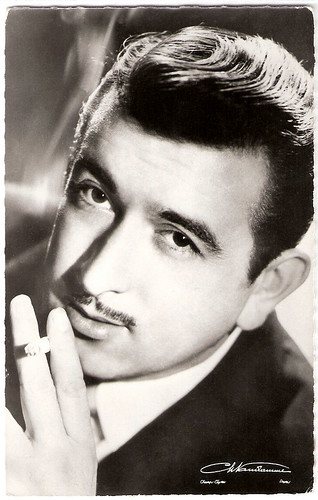
French postcard by Editions du Globe, Paris, no. 294. Photo: Ch. Vandamme, Paris.
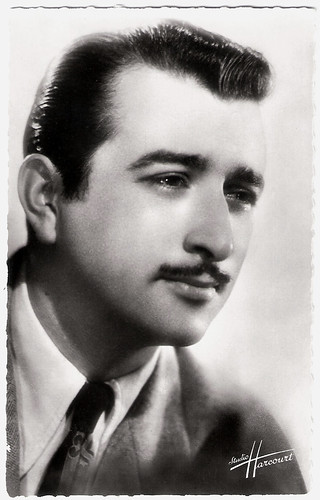
French postcard by Editions du Globe, Paris, no. 183. Photo: Studio Harcourt.
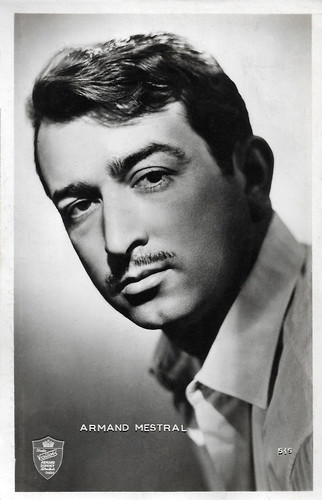
French postcard by Editions P.I., Paris, no. 13 G. Photo: Studio Vallois / Armand Duminy, Paris.
Sources: Wikipedia (French and English) and IMDb.
This post was last updated on 7 August 2025.

French postcard by A.N., Paris, no. 1273. Photo: Roger Carlet.

French postcard by Studio Star, Paris. Photo: Star, Paris.
Bad guy
Armand Mestral was born in 1917 in Paris, France, as Armand Serge Zelikson. His father was the Russian sculptor Chlioma Zelikson, and his mother was the designing artist Alice Eugénie Mestrallet.
Armand began his career as a lyrical singer with a beautiful bass voice at the Saint-Roch church in Paris. He was engaged in the Gaîté-Lyrique theatre and appeared in operettas such as 'Le Pays du sourire' (The Land of Smiles) by Franz Lehár, 'Colorado' and 'Gypsy Song' by Maurice Yvain. He recorded several chansons and his French versions of 'Jézabel' (Jezebel) and 'Mississippi' (Ol' 'Man River) were among his greatest hits, which also included 'Chant des partisans' and 'L'Internationale'.
During the Second World War, he participated in the Resistance by sending messages through the collaborationist journal 'La France socialiste'. After the war, he started to play in films, first often as a bad guy. His film debut was L'extravagante mission / The Queer Assignment (Henri Calef, 1945). Till 1992, he appeared as an actor and a singer in more than seventy French films from 1945 to 1992.
In 1953, he sang the French song 'Le Beau Pedro' in the comedy Soyez les bienvenus / Welcome (Pierre Louis, 1953). The song, which was written by Henri Betti (music) and Jean Nohain (lyrics), was also used that year in the hit film Le Portrait de son père / His Father's Portrait (André Berthomieu, 1953) with Jean Richard and Brigitte Bardot.
A well-known film with Mestral was Gervaise (René Clément, 1956) starring Maria Schell and based on the novel 'L'Assommoir' by Émile Zola. Schell plays a working-class woman in the mid-nineteenth century, trying to cope with the descent of her husband (François Périer) into alcoholism. Mestral played Lantier, Gervaise's former lover. The film was nominated for the Best Foreign Language Film at the 29th Academy Awards. Schell won the Volpi Cup for Best Actress at the 1956 Venice Film Festival.
He played a chauffeur in the crime film Enigme aux Folies-Bergère / The Enigma of the Folies-Bergere (Jean Mitry, 1959) about a series of murders at the Folies-Bergère. Mestral co-starred with Bella Darvi, Frank Villard and Dora Doll.

French postcard by Editions P.I., Paris, offered by Les Carbones Korès, no. 27 E / 458. Photo: Ch. Vandamme.

French postcard by Editions P.I., Paris, offered by Les Carbones "Arrow" "Carbofrance", no. 160. Photo: Ch. Vandamme, Paris.
International co-productions
During the 1960s, Armand Mestral appeared in several international co-productions, like the Peplum Morgan il pirata / Morgan, the Pirate (André de Toth, Primo Zeglio, 1960). Steve Reeves starred as Sir Henry Morgan, the 17th-century pirate who became the self-proclaimed governor of Jamaica. In Italy, he also appeared in the French-Italian coproduction L'ammutinamento / White Slave Ship (Silvio Amadio, 1961), starring Pier Angeli and Edmund Purdom, and in the adventure film Duello nella Sila / Duel of Fire (Umberto Lenzi, 1962), starring Fernando Lamas and Liana Orfei.
Back in France, he played a supporting part in the crime film Chair de poule / Goosebumps (Julien Duvivier, 1963) starring Robert Hossein, Catherine Rouvel and Jean Sorel. The screenplay was based on the novel 'Come Easy, Go Easy' by James Hadley Chase, which took several plot elements from 'The Postman Always Rings Twice' by James M. Cain.
In Germany, he appeared in the French-West German drama Begegnung in Salzburg / Encounter in Salzburg (Max Friedmann, 1964) starring Curd Jürgens, Nadia Gray and Viktor de Kowa. He also played i the French-Italian-Spanish adventure film Surcouf, le tigre des sept mers / The Sea Pirate (Sergio Bergonzelli, Roy Rowland, 1966), featuring Gérard Barray. He also had a small role in the American war film Lost Command (Mark Robson, 1966) starring Anthony Quinn, Alain Delon, George Segal, Michèle Morgan, Maurice Ronet and Claudia Cardinale. The film, based on the best-selling 1960 novel 'The Centurions' by Jean Lartéguy, focuses on the story of French paratroopers battling in French Indochina and French Algeria.
On television, he frequently participates in such popular series as Les Cinq Dernières Minutes / The Last Five Minutes (1958-1960), Les Brigades du Tigre / The Tiger Brigades (1976) with Jean-Claude Bouillon, and Les Enquêtes du commissaire Maigret / The Investigations of Commissioner Maigret (1970, 1982) with Jean Richard. He also played in many TV films. His later films included Mon oncle Benjamin / My Uncle Benjamin (Édouard Molinaro, 1969), starring Jacques Brel and Claude Jade, and Deux hommes dans la ville / Two Men in Town (José Giovanni, 1973) with Jean Gabin and Alain Delon.
Mestral was married twice to Jacqueline Martin. They married in 1941 and had two children, composer and conductor Patrice Mestral and actress Marie-Claude Mestral. They divorced in 1957, but remarried in 1973. Armand Mestral passed away in 2000 in Paris, France. He was 82. His wife, Jacqueline, survived him. He was buried in the Montparnasse cemetery, in front of which he lived for many, many years.

French postcard by Editions du Globe, Paris, no. 294. Photo: Ch. Vandamme, Paris.

French postcard by Editions du Globe, Paris, no. 183. Photo: Studio Harcourt.

French postcard by Editions P.I., Paris, no. 13 G. Photo: Studio Vallois / Armand Duminy, Paris.
Sources: Wikipedia (French and English) and IMDb.
This post was last updated on 7 August 2025.
No comments:
Post a Comment